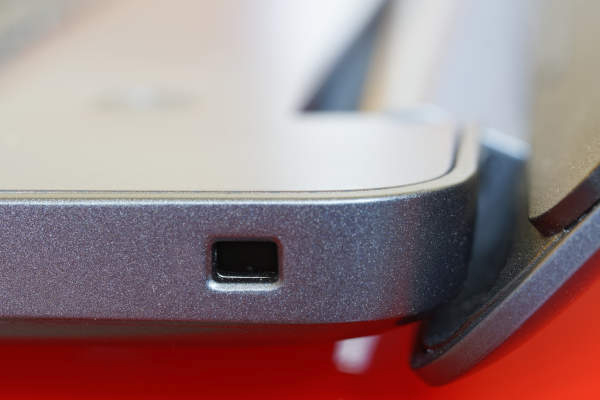Tech Solutions IT Blog
Protect Your Laptop from Theft
We talk about cybersecurity a lot. We talk about protecting your data from the illusive threat that hackers and cybercriminals bring. We don’t often talk about the more obvious type of security - preventing the physical theft of your data. I think it’s time.
How to Physically Secure Your Laptop
Many (not all) laptops have a built-in feature that makes it easy to physically protect it from theft. It’s actually pretty likely to get confused for a port on the side of the device.
Here’s what it usually looks like:

Typically on the side or front base of the laptop, this little port is called a Kensington Security Slot. It’s designed to work with a Kensington Lock/Cable to physically secure the device to an anchor point.
Invest in a Kensington cable and lock and you can chain your device to a table or anything else that isn’t going to move easily. Think of it like a bicycle lock.
It’s a simple, yet effective anti-theft solution that doesn’t cost much, and many laptops have the slot built in. When buying laptops, you can check with the manufacturer or work with Tech Solutions IT to make sure they have Kensington slots.
What To Do If Your Laptop Is Stolen?
If your laptop gets lost or stolen, there are some steps you need to take right away.
Report It
If it is a work laptop, or is used for work in any way, you need to tell your employer. If you own the device, you’ll want to alert the authorities. It really helps to have a serial number handy (also displayed as an IMEI, usually on the back or underside of the device). Of course, most cases don’t see a return of the stolen device, but you never know.
Disable Browser Sync
This is a useful feature many people might not even know they are using. If you are logged in to Chrome or Firefox, you can sync passwords and bookmarks and other settings when logging into the browser on another device. This means anything on your desktop could just get synchronized over to your missing laptop even after you change your password.
In Chrome, look in settings for Show Advanced Settings and click Choose what to sync. In the dropdown menu, uncheck everything. Then select Encrypt all synced data with your own sync passphrase and create a strong, unique password to prevent anyone else from getting it.
Change Your Passwords
Now you need to change your passwords. All of them. If that laptop was used to log into your bank, your email, your Facebook, etc., you need to plan on changing all of your passwords. That includes your work passwords. Everything. Every single password. We can’t stress that enough.
Each and every one.
Change Your Bank Cards
If you use the device for any sort of online shopping or have paid your bills on it, you likely need to do this. Some sites will store your credit card information, and if you are still logged in to any of these sites, the thief can get access (it doesn’t matter if you’ve shut down the laptop or closed your browser, you can still be logged in). You’ll also want to monitor your bank and credit card, and even your credit score for several months or more, just in case.
Of Course, Being Proactive Is Better
Other than physically locking down your device, there are a number of ways you can proactively prevent the loss or theft of data. We encourage you to reach out to us at Tech Solutions IT to ensure that your business isn’t at risk if you or an employee were to lose a company device.
Give us a call today at (888) 225-2672.

Comments